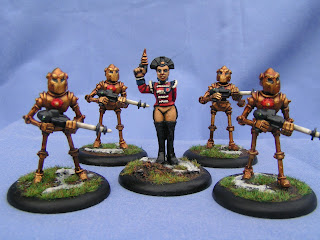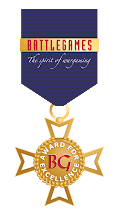I have finished the modelling and moulding of the robot heads and have started painting. I felt that a short description of the casting processes I have used for the heads might be useful.
As detailed in the earlier entry I wanted to model some 40mm robots based on the Hydra Legionnaire Robots and inspired by the golden Ming Robots in the animated series flash Gordon. My first job was checking out the series on You Tube and making rough sketches. The problem with the series is that the design and drawing of the robots, profile and straight-on do not match up. The final drawings were an amalgamation of two or three images and sketches.
Once I had the design I wanted, I re-scaled the drawings to the same size as the Hydra Robot heads (about 10mm tall) and modelled the shape from lamination's of plastic card. The initial shape is very much like a traditional viking helmet. The shape was first carved and then sanded smooth. Please note - the finished head was the third attempt, the first two being discarded long before I started to add 'green stuff'.
Modelling with 'green stuff' followed and this was pretty easy. The only issue I had was the two 'eyebrows' which being so small, but such an important part of the cartoon robot needed to be modelled with some care.
I then needed to make a mould. I used a product called
Siligum, a silicone moulding paste made by
Gedeo which you can pick up in specialist arts and crafts stores. It is a two-part soft clay material, which comes in blue and white parts and when mixed you have about 10 minutes before it goes off. I used a Plasticine base in a Lego box and then pressed the
Siligum into the Lego box with a small plastic card rectangle. Once the first part was set, I produced the second part in the same way - with a Vaseline barrier between the two parts.
I cut a small air vent that will help later, which was carved as an extension to the neck of the robot head and now on to the resin casting. I mixed up some standard two part automobile repair resin, bought from
Halfords and while I was waiting for the two parts to react, I brushed on some warm Vaseline to the two part mould. I added the resin to each of the mould halves and prior to going hard, pressed the two mould halves together. I use two small pieces of plastic card either side of the mould and gently squeeze the mould to ensure that the resin is fully filling the mould.
DANGER; I then blow into the vent hole that I carved into the mould. I believe that this forces the resin into all parts of the mould and should give a better casting. I am not sure how safe this is, so anyone copying this technique should be very careful.
The mould is left for about 20 minutes while the resin fully sets and then the head was removed. five castings later (actually six as one of the castings had a huge air bubble) I have my Flash Gordon Robot heads. They were washed and cleaned, then sanded smooth with a fine sanding stick, before the neck area was cut to size and super glued to the bodies.
The only issue I had during the whole modelling/casting process was the large amount of waste resin, caused by having to mix up six
separate cups of resin, one for each head. I am not sure that there is an easier w
ay to do this?
The five miniatures were then undercoated and sprayed black, before I started painting the figures. I hope that this tutorial helps other modellers produce their own castings.
Tony
 Tony
Tony




 The construction was based on the Fiddlers Green Aerial Carriage and re-scaled to 1/300th (or 1mm = 1foot). Construction started with the main body, which was first carved and then sanded to shape. The wing and tail are 1mm plastic card and the struts are sanded cocktail sticks. Other detail comes from the spares box or plastic card/plastic rod.
The construction was based on the Fiddlers Green Aerial Carriage and re-scaled to 1/300th (or 1mm = 1foot). Construction started with the main body, which was first carved and then sanded to shape. The wing and tail are 1mm plastic card and the struts are sanded cocktail sticks. Other detail comes from the spares box or plastic card/plastic rod. 

 Mounted on a 40mm round base the model is 46mm tall. The claws on the feet had to be cut off and re-modelled with 'green stuff' to fit the 40mm base and the green colour scheme is a little predictable, but I like the miniature and it fits a classic Lizardman profile better than others I have seen.
Mounted on a 40mm round base the model is 46mm tall. The claws on the feet had to be cut off and re-modelled with 'green stuff' to fit the 40mm base and the green colour scheme is a little predictable, but I like the miniature and it fits a classic Lizardman profile better than others I have seen. 










